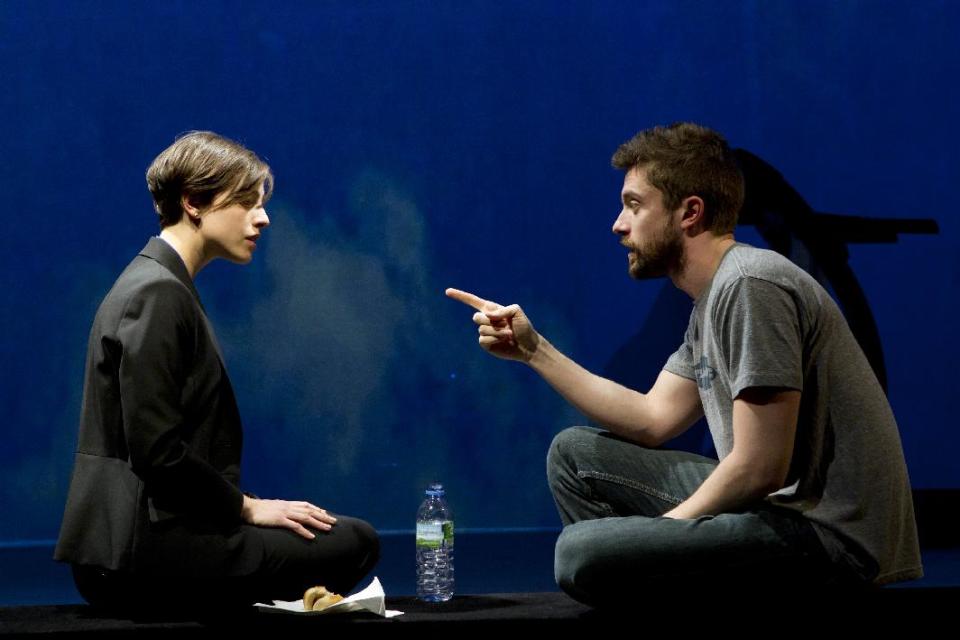Review: Touching but forced 'Lonely, I'm Not'
NEW YORK (AP) — Heather and Porter's relationship is having a rocky start midway through Paul Weitz's new comedy "Lonely, I'm Not."
"I was hospitalized for four months, I have recurring dreams about my terminally ill mother, and I cry when I have sex with you. Ready to run for the hills yet?" Porter asks his budding girlfriend.
"I can't really run off anywhere," she replies. "I'm blind."
Starring the very likable Topher Grace and Olivia Thirlby, "Lonely, I'm Not" is a touching and winsome but sometimes forced comedy that made its world premiere at Second Stage Theatre and opened Monday.
Weitz's two leads are well acquainted with his love affair with self-discovery, having lured them to his work before — Grace starred in his "In Good Company," and Thirlby is in his upcoming "Being Flynn." Trip Cullman directs with a calm energy that enhances the stutter-steps of these lovers and often requires separate but overlapping actions in two apartments.
The new play is about a former high-flying Los Angeles-based corporate "ninja" on the mend following a meltdown and a divorce. He's been spending a lot of time lying on the floor in the dark, basically blind to his gifts and charm, but he's starting to think about rejoining the workforce and dating again.
Grace, the witty teen Eric Forman on the Fox sitcom "That '70s Show," has the remarkable ability to express emotion without showing emotion — a detached and ironic look from him somehow speaks volumes. Although probably better suited to the screen, Grace's distance from his own emotions nicely works here because his character is such a sad sack, numb to himself.
Thirlby's Heather is quite the opposite — a take-charge business analyst who happily works weekends, lusts after the next rung in the corporate ladder and insists on Silk vanilla creamer in her coffee. But she's blind (no, really) to what really matters: love. Thirlby turns in a lovely portrait of a strong young woman frustrated by the way the world condescends to her and refuses to acknowledge her own limitations.
"You see she's like a tightrope walker. So beautiful. So focused. But there's no net," her mother tells Porter. "There's no real net underneath her. She's just walking out on that thin rope."
Porter really shouldn't be in a relationship. His ex-wife (one of several nice turns by Maureen Sebastian, who also plays Heather's roommate) still comes over to fool around, his college friend (Christopher Jackson) is trying to lure him back to corporate ninja-hood and even his Latvian maid (Lisa Emery, who shows her range by also playing Heather's slightly nagging mother) knows something is wrong.
These two star-crossed lovers are perfect together. She likes that he's brutally honest. He likes that she's not needy, and he recognizes her fire as something he once shared. Will they stay together? Weitz isn't sure. His character sketches done, now the playwright looks for some jeopardy to put these new lovers in. A New York job offer comes in handy.
Weitz, the writer and director who shared an Academy Award nomination for adapted screenplay in 2002 for "About a Boy," is at his most poignant when keeping the script simple.
When Heather is trying to map out Porter's apartment in her mind, she offers him a piece of advice that echoes later: "Just start somewhere. And then everything else falls into place." But while Heather's blindness opens up some funny opportunities to look at how couples behave, it's too clunky and too strained a metaphor.
One of the best things about the production is Mark Wendland's scenic design, which gives Weitz's story a fresh, clean, cinematic feeling. The playwright has broken up his multiple scenes with titles — "2 a.m.," ''The Deal," ''Promotion" — and Wendland has created huge lit-up letters of various sizes and shapes that appear through the scrim after blackouts. Sometimes it gets a little too "Sesame Street," but mostly it's a winking triumph, as when the word "Dad" is used in a neon arrow that, indeed, points to dad. (Veteran Mark Blum showing great subtle skill as Heather's boss, too.)
The various threads of the play come together nicely at the end, even if the direction of the main romance is left not completely clear. There is hope, though, that the title of the play will prove true for Heather and Porter.
___
Online:
http://www.2ST.com



